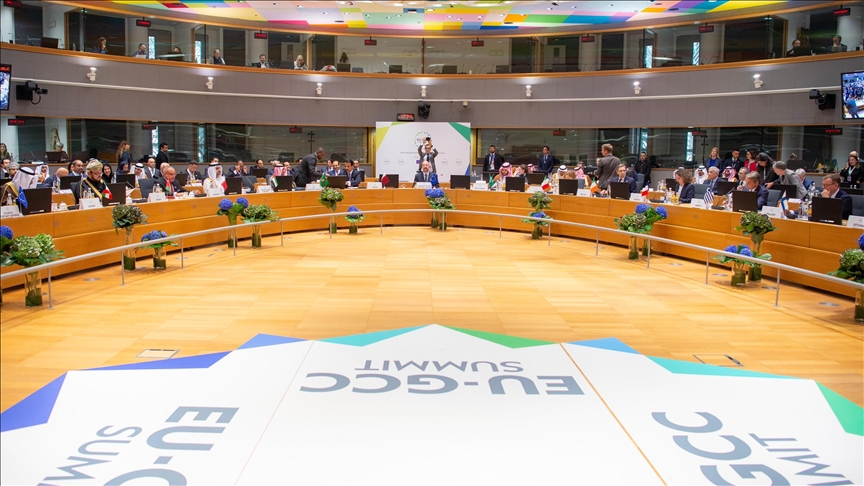EU, Gulf countries express 'grave concerns' over Israeli attacks on UN peacekeepers in Lebanon
Joint statement by EU and Gulf Cooperation Council calls for immediate, full, complete ceasefire, release of hostages, exchange of Palestinian prisoners
 European Union - Gulf Cooperation Council Summit in Brussels. Credit: BANDAR ALGALOUD / SAUDI ROYAL COURT / HANDOUT
European Union - Gulf Cooperation Council Summit in Brussels. Credit: BANDAR ALGALOUD / SAUDI ROYAL COURT / HANDOUT
LONDON
The EU and the Gulf Cooperation Council on Wednesday said they condemn all attacks on UN missions, expressing “particularly grave concerns” over Israel's recent attacks on UN peacekeepers in Lebanon (UNIFIL).
"We are extremely concerned by the dangerous escalation in Lebanon, affirm our support for the Lebanese people," the EU and the Gulf Cooperation Council (GCC) said in a joint statement following their first summit in Brussels.
They also expressed their "utmost concern" over recent developments in Israel, Gaza, and the West Bank, as well as Israeli operations there, saying that they strongly condemn ongoing extremist settler violence in the West Bank, including East Jerusalem.
"We condemn the Israeli government’s decisions to further expand settlements and legalise settler outposts across the occupied West Bank and urge Israel to reverse these decisions," said the joint statement.
The EU and the council urged an immediate halt to all unilateral measures that undermine prospects for peace including Israeli settlement activities, land confiscation, the displacement of Palestinians, and violations of international law.
The statement called for full implementation of UN Security Council Resolution 2735, “including an immediate, full and complete ceasefire, the release of hostages, the exchange of the Palestinian prisoners as well as immediate and unimpeded humanitarian access to civilian population.”
"We call on all parties to comply with their obligations under international law, including international humanitarian law and the implementation of International Court of Justice orders notably with regard to the protection of civilians, especially children," it added.
The statement also condemned attacks on civilians and civilian infrastructure, urging all parties to allow, facilitate, and enable the full, rapid, safe, and unhindered delivery of expanded humanitarian assistance to Palestinian civilians.
The EU and the Gulf Cooperation Council reaffirmed their commitment to a two-state solution for the Mideast, also stressing that "actions weakening the Palestinian Authority must stop."
"We reaffirm our unwavering commitment to the realization of the right of the Palestinian people to self-determination through the Two-State solution where Israel and Palestine live side by side in peace within secure and recognized borders, along the 1967 lines."
The statement also condemned all attacks on UN missions, saying that the parties expressed "particularly grave concerns" over Israel's recent attacks on UN peacekeepers in Lebanon.
On Sunday, Israeli tanks reportedly forced entry into a UN Interim Force in Lebanon (UNIFIL) position, marking the latest in a series of incidents that have left several peacekeepers injured.
'Iran must never develop or acquire a nuclear weapon'
The EU and the council also underscored the importance of diplomatic engagement with Iran "to pursue regional de-escalation."
"We stress the importance of ensuring the peaceful nature of the Iranian nuclear program, and ceasing of proliferation of ballistic missiles and unmanned aerial vehicles."
They expressed shared interest in a close EU-Gulf Cooperation Council dialogue on these issues, adding that the parties called on Iran to pursue regional de-escalation.
"We remain committed to a diplomatic solution to the Iranian nuclear issue," said the statement.
However, it stressed: "We share a clear determination that Iran must never develop or acquire a nuclear weapon."
The summit, co-chaired by European Council President Charles Michel and Qatari Emir Sheikh Tamim bin Hamad Al Thani, as the Gulf Cooperation Council’s rotating president, is expected to focus on various issues, including common key global challenges, economic cooperation, including trade and investment, energy, sustainability, and climate.
Israel has mounted a huge air campaign in Lebanon against what it claims are Hezbollah targets since Sept. 23, killing more than 1,500 people and displacing more than 1 million.
The aerial campaign is an escalation from a year of cross-border warfare between Israel and Hezbollah since the start of its offensive on the Gaza Strip, in which Israel has killed nearly 42,400 people, most of them women and children, since a Hamas attack last year.
Israel expanded the conflict on Oct. 1 by launching an incursion into southern Lebanon, ignoring warnings that this could escalate the war into a regional conflict.
Anadolu Agency website contains only a portion of the news stories offered to subscribers in the AA News Broadcasting System (HAS), and in summarized form. Please contact us for subscription options.







